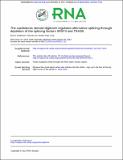| dc.contributor.author | Anderson, Erik S. | |
| dc.contributor.author | Lin, Chia-Ho | |
| dc.contributor.author | Xiao, Xinshu | |
| dc.contributor.author | Stoilov, Peter | |
| dc.contributor.author | Black, Douglas L. | |
| dc.contributor.author | Burge, Christopher B | |
| dc.date.accessioned | 2014-02-07T16:39:22Z | |
| dc.date.available | 2014-02-07T16:39:22Z | |
| dc.date.issued | 2012-03 | |
| dc.date.submitted | 2012-02 | |
| dc.identifier.issn | 1355-8382 | |
| dc.identifier.uri | http://hdl.handle.net/1721.1/84678 | |
| dc.description.abstract | Modulation of alternative pre-mRNA splicing is a potential approach to therapeutic targeting for a variety of human diseases. We investigated the mechanism by which digitoxin, a member of the cardiotonic steroid class of drugs, regulates alternative splicing. Transcriptome-wide analysis identified a large set of alternative splicing events that change after digitoxin treatment. Within and adjacent to these regulated exons, we identified enrichment of potential binding sites for the splicing factors SRp20 (SRSF3/SFRS3) and Tra2-β (SFRS10/TRA2B). We further find that both of these proteins are depleted from cells by digitoxin treatment. Characterization of SRp20 and Tra2-β splicing targets revealed that many, but not all, digitoxin-induced splicing changes can be attributed to the depletion of one or both of these factors. Re-expression of SRp20 or Tra2-β after digitoxin treatment restores normal splicing of their targets, indicating that the digitoxin effect is directly due to these factors. These results demonstrate that cardiotonic steroids, long prescribed in the clinical treatment of heart failure, have broad effects on the cellular transcriptome through these and likely other RNA binding proteins. The approach described here can be used to identify targets of other potential therapeutics that act as alternative splicing modulators. | en_US |
| dc.description.sponsorship | National Institutes of Health (U.S.) (grant 4F30AG033993) | en_US |
| dc.description.sponsorship | National Institutes of Health (U.S.) (grant R01 GM08431) | en_US |
| dc.description.sponsorship | Howard Hughes Medical Institute (Investigator) | en_US |
| dc.language.iso | en_US | |
| dc.publisher | Cold Spring Harbor Laboratory Press | en_US |
| dc.relation.isversionof | http://dx.doi.org/10.1261/rna.032912.112 | en_US |
| dc.rights | Creative Commons Attribution-Non-Commercial 3.0 (CC-BY-NC) | en_US |
| dc.rights.uri | http://creativecommons.org/licenses/by-nc/3.0/ | en_US |
| dc.source | Cold Spring Harbor Laboratory Press | en_US |
| dc.title | The cardiotonic steroid digitoxin regulates alternative splicing through depletion of the splicing factors SRSF3 and TRA2B | en_US |
| dc.type | Article | en_US |
| dc.identifier.citation | Anderson, E. S., C.-H. Lin, X. Xiao, P. Stoilov, C. B. Burge, and D. L. Black. “The cardiotonic steroid digitoxin regulates alternative splicing through depletion of the splicing factors SRSF3 and TRA2B.” RNA 18, no. 5 (April 16, 2012): 1041-1049. © 2012 RNA Society. | en_US |
| dc.contributor.department | Massachusetts Institute of Technology. Department of Biology | en_US |
| dc.contributor.mitauthor | Burge, Christopher B. | en_US |
| dc.relation.journal | RNA | en_US |
| dc.eprint.version | Final published version | en_US |
| dc.type.uri | http://purl.org/eprint/type/JournalArticle | en_US |
| eprint.status | http://purl.org/eprint/status/PeerReviewed | en_US |
| dspace.orderedauthors | Anderson, E. S.; Lin, C.-H.; Xiao, X.; Stoilov, P.; Burge, C. B.; Black, D. L. | en_US |
| mit.license | PUBLISHER_CC | en_US |
| mit.metadata.status | Complete | |
